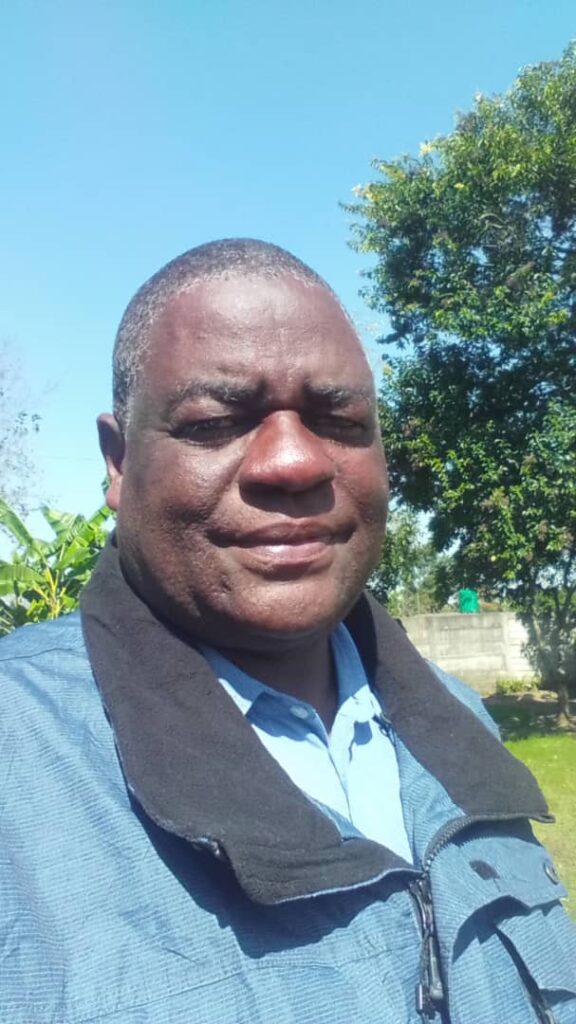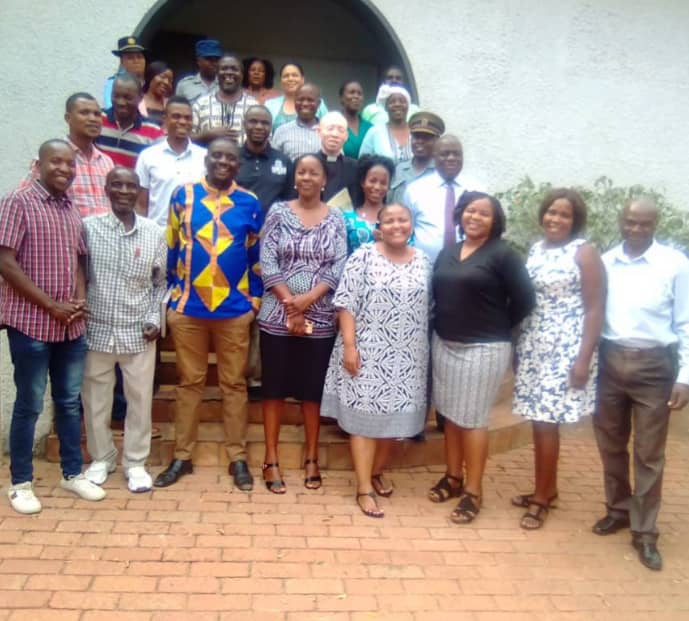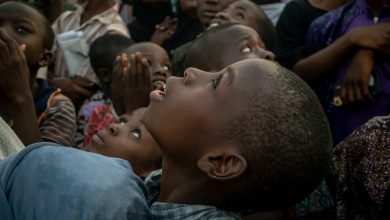…as INERELA+ unveils Hands Off Manual, opening acceptance of sex workers
“WE believe in the need to work against Gender-Based Violence (GBV), INERELA+, as an organisation is in a clarion call to reduce violence against women and girls. If we collaborate with our partners, we believe we can lessen GBV,” is Elder Paul Carrie’s Juru’s clarion call as we start 2023.
Elder Paul Carries Juru is the National Coordinator for the International Network of Religious Leaders Living With or Personally Affected by HIV/AIDS,(INERELA+ Zimbabwe).
Elder Juru called on communities to expose perpetrators of violence.
“If perpetrators are brought to book, we could see a reduction of violence in everyone. Human dignity is central in our work, we work with the police, legal fraternity, the health personnel, the authorities in communities, traditional leaders, everyone to promote harmony and tranquillity,” said Elder Juru in an interview.
“Our work with the Ministry of Health and Child Care, the National Aids Council, (NAC) the UN family, the World Council of Churches (WCC), traditional leaders and many stakeholders not mentioned requires more volunteers to come and join us because ending GBV is always work in progress.
“To us, the campaign of Positive Faith in Action is not for the 16 Days against the violence that runs end of November to 10 December annually, it is a 365 days Campaign. Every day is supposed to be a safe day, that is our mantra,” he added.
In the spirit of combating GBV, INERELA+ held a regional virtual meeting sharing experiences on their country chapter networks on GBV as 2022 came to an end. Hands Off Manual, (HOM) is a guiding manuscript that INERELA+ used.
Rev Stephen Manja, Ambassador for INERELA+ Zimbabwe appreciated the Hands Off Manual (HOM) for opening the inner eye to listen and respect others.
“In the Bible, Tamar seduced Judah, showing that sex workers, (SW) existed. With many religious leaders seeing evil, the HOM is a tool to change that perception. With a view of sex workers changed, the marginalised are people like everyone else,” said Rev Manja.
Elder Juru spoke of respect that must be fostered in a two-way relationship.

“We have been harming sex workers in the name of morals, seeing them through our moral lenses without listening to them. By treating them with dignity and respect, sex workers have adjusted to respect them too. This mutual respect is a two-way process fostering Bible teachings. We are all made in the image of God,” said Elder Juru.
The manual is in demand, WCC, UNAIDS, and religious leaders, are asking for copies.
“In Zimbabwe, Advocacy work is ongoing with engagement with Members of Parliament, ( MPs) who now are enlightened. This resulted in the striking down of the criminalisation of HIV, a milestone. We are working on the sex work aspect now,” Elder Juru added.
In the meeting were sex workers, with one giving testimony to the new safe space that churches were now offering.
“Through working with INERELA+ we now have skills, we have children and are now able to look after them. We are now celebrated sex workers, we thank the religious leaders who are using the church as a home to spread the word of inclusion, and we now can also attend church service without being judged. I hope that more churches become safe spaces for us to pray too,” said the SW.
In Beitbridge, the religious leaders there are grateful as they are now able to accommodate sex workers.
In Stoneridge, a new high-density settlement in Harare, working with SW has created an enabling environment.
Tino, a SW had this to say: “We know that we have partners in INERELA+ Zimbabwe and that mutual understanding is important to us and we welcome it.”
Elder Juru emphasised the importance of partners.
“We are forming alliances with partners interested in our work, a Swiss research organisation working on sex workers’ health has requested to work with us. Religious spirituality struggles cause confusion, the manual is helping us, it is a beauty,” said Elder Juru.
A journalist from Zimbabwe slammed the use of derogatory language.
Prostitute which is demeaning.
The media has a role in using the correct language.
“As media, we are guilty of using hate language which fans violence. We must use correct language that respects people,” said the journalist.
From Zambia,
Ambassador Stanley Mwanza was pleased with the change in the mindsets.
“The HOM has changed our mindsets, an eye opener. We judged them as prostitutes, repent, repent, without listening to them. We did not respect them at all. Through listening, we realised the push factors resulted in this. The Pastor and Brother Intervention has brought change for the better.”
Ambassador Raphael S Mtulikwa noted the importance of first being the change one wants to see.
“Change can not occur if those initiating the change have not changed,” he said.
“The HOM was what we needed to realise that we needed to change first for the change we wanted.
“Language use is stigmatising, calling them prostitutes, not humans, all this causes exclusion and is a barrier itself.
“In Zambia today, some pastors see me as not fit to be a pastor because of my new relationship with SW. I got enlightened by HOM. They too need to read the manual to understand. This now is our new chapter, sharing the manual widely among our own religious leaders,” said Ambassador Mutilikwa.
Also from Zambia, Chikoyi Chapala stated the importance of radio as a means of information dissemination.
“Stories transform lives, enabling humanity to co-exist, leaving no one behind.
“Zambia has 170 radio stations, with social media for the young, working with Women 24 Gender Mainstreaming has managed to get the message through,” said Chapala, a journalist.
Erica, a sex worker, welcomed the work by ZANERELA+ and looked forward to opening up of safe spaces.
“We now are able to pray too in Church, we meet pastors, talk to them, they listen and we now feel loved, thanks to ZANERELA+,” said Erica.
From South Africa,
SANERELA+ trained 25 faith leaders in Mpumalanga, funds permitting, they intend to train more.
“We had challenges with some faith leaders saying we are promoting sex workers. They too needed to go through the HOM to understand.
Gauteng trained 18 traditional health practitioners, (THP).
With SW facing barriers from some healthcare workers, some end up seeking services from THP.
Engagement helped reach the lesbians, gays, bisexuals, transgender, intersex and queer, (LGBTIQ) community and SW to monitor access to treatment.
“In Hillbrow, some SW faced stigma and were lost to care. We took them back to clinics.
We reunited some with their families.
“One of our pastors attended a Sisonke Indaba in Durban. We look forward to expanding the project in 2023 despite limitations to funding,” said Bishop Nlapo, of SANERELA+.
Also from South Africa was Rev Msimanga who spoke of the need for family acceptance as a stepping stone.
“We are reaching out to religious leaders who have children who are SW and have rejected them. The manual opened our eyes, some religious leaders have accepted their children back home,” said Rev Msimanga.
To testify was a sex worker who was happy with the time the manual came out.
“The manual came out at the right time, just knowing that the Government and Church support us is warming, we had stopped worshipping,” said a SW.
Sisonke’s Koli Buthelezi was happy to note the progress and is now privileged to live in such a time where religious leaders respect them.
Bishop Nlapo was also grateful that the manual opened their eyes to remove the “them” and “us” barrier after attending training, their outlook changed.
A young Pastor, Zandile Mkalipi said the training in May was helpful in bridging the widening rift.
“Perception, acceptance, and compassion, made us realise the need to uphold everyone’s rights. Stopped calling them names, no to stigma and shaming, thanks to HOM,” said Pastor Mkalipi.
From Mozambique,
was Nelson Mariqueza, a journalist with a reproductive health background and working with MONERELA+.
He stressed the urgent need for a communication working plan, a technical plan, and a financial plan for work to be successful.
Caesar Mufanequiro was grateful that the HOM has achieved a lot.
“We now need to document our work, we need to expand to other provinces and find ways to sustain the project.
Trained champions to work in their attachment areas, not only with sex workers but with key populations, and LGBTIQ.
We now have an MoU with SW on areas of interest,” said Mufanequiro.
From Botswana
was Edna Maine, BONERELA+ who asked to have HOM translated into the vernacular language, Setswana, for effective use in villages.
With 50 religious leaders trained in Botswana, the relationship between the two is improving.
Rev Jankie, BONERELA+ noted that the project took off well, despite disturbances during the COVID-19 era.
“As trained religious leaders, we are now effective in communication with SW. However, some religious leaders still argue that the two can’t work together.
Some religious leaders maintain that the church has no business with SW. Yyou are promoting sex workers, they say.
Engagement with these leaders to prove that the “The church is not just a building, the church’s work is to spread the word and is not confined to the four walls. We must reach out to the marginalised populations outside the church, be fishers of men,” said Rev Jankie.
Interfaith inclusion is work in progress to bring light to those religious leaders still not in agreement.
“We do not want this work to be a hit and run experience. We should continue,” said Rev Jankie.
Leatile Mmutle said that Botswana is a very conservative nation but is warming up and listening to conversations.
“The country has decriminalised same sex marriage through education which is continous engagement through mass media.
With a high literacy rate, standing at 80%, makes education of anything new managed as a necessity,” Mmutle added.
On the whole, the feedback meeting was successful with the region coming together into 2023 capacitated with engagement and understanding.
What affects a neighbour is cause of concern. The similarities of the challenges make INERELA+ work possible for shared experiences and hope to achieve better outcomes collectively.
● Feedback: [email protected]




